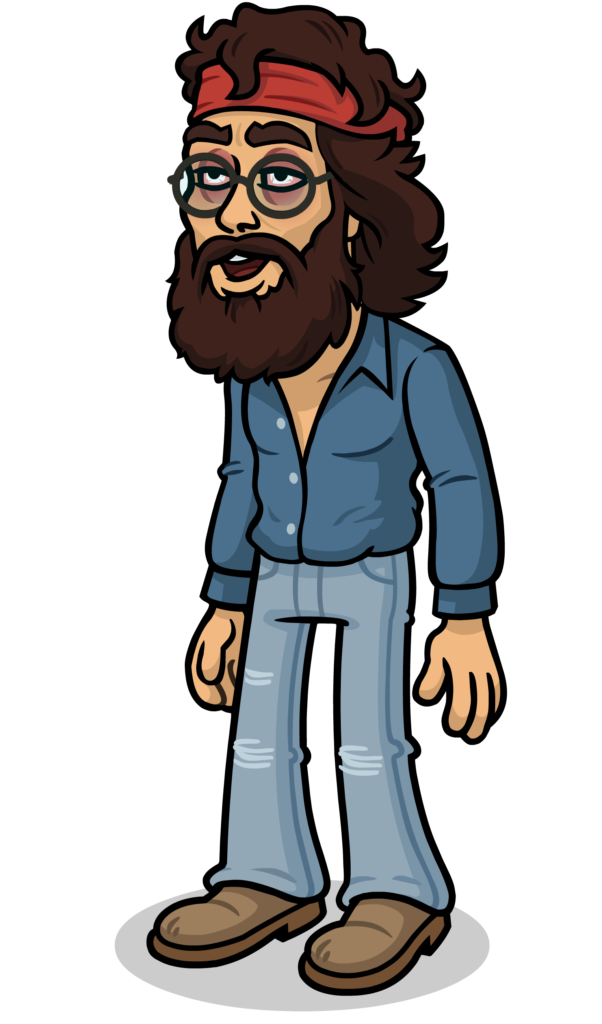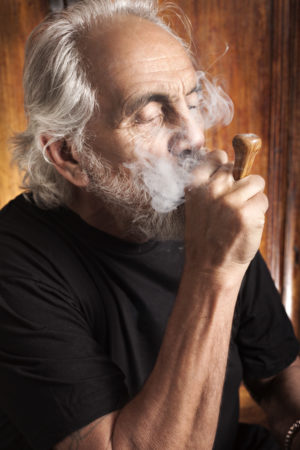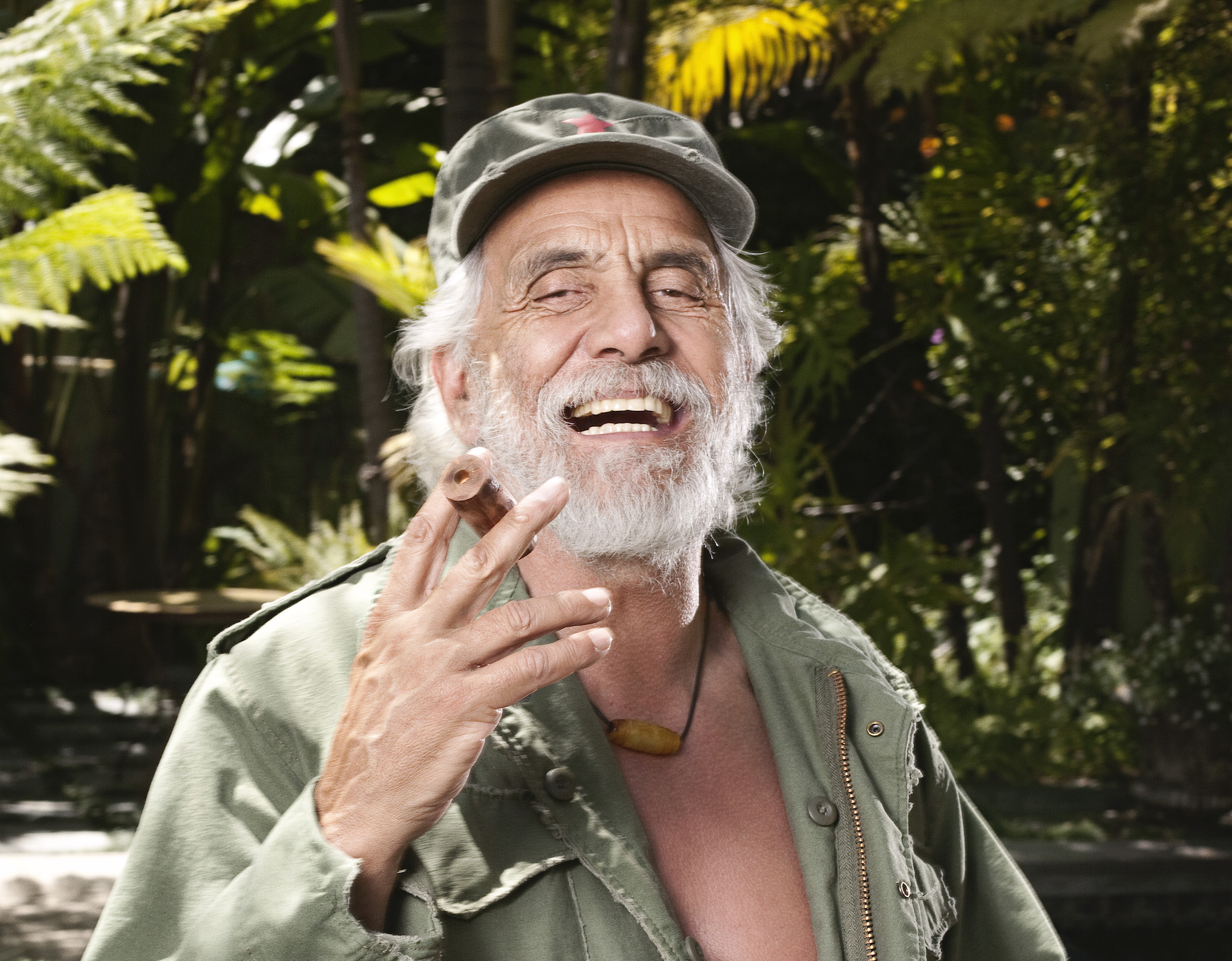Tommy Chong is a godfather of all things cannabis-related, including the unofficial stoner holiday of 4/20. Yet being a face for the present day marijuana moment is not necessarily the point, believe it or not, as pot has been but a means to an end—a lifestyle, but not a life—to the nearly 82-year-old Chong.
The weed-stoked partnership he’s shared since 1971 with Cheech Marin as Cheech & Chong (broken between 1985 and their reunion in 2002) that continues to yield products such as their first-ever mobile app game Bud Farm, the Tommy Chong product line of smokables and ephemera, as well as his long-prescient marijuana legalizing advocacy—these stand second to his spiritual life, his social activism, his trust in the good, and staying alive beyond the pandemic. And control. Chong is big on control, as he wrote and directed Cheech & Chong’s films such as Up in Smoke (1978), Cheech and Chong’s Next Movie (1980), and Nice Dreams (1981), and steered the pair’s album-making path by producing the likes of Big Bambu (1972).
On the occasion of the 4/20 release of Bud Farm, Chong spoke about all of that—the comic past, the smoky present, and living long through Trump and COVID-19.
As famous as you are for your relationship to weed, you must be leery of anyone who seeks your endorsement. Whether it’s a game or hard product, what are you looking for in regard to giving your good housekeeping seal?
It has to be something or someone that helps civilization. Truly helps. I would never sponsor anything that would hurt people. Like cigarettes or beer. I had a chance to do a beer, to have my own beer, not long ago and I said no thanks. I didn’t want to find out that somebody had been in a car wreck, and had died with beer bottles with a picture of my face next to them. Having my face on a bag of pot or a joint, that’s not something that’s going to kill you.
How then does a video game such as Bud Farm suit that criteria beyond its being free for download?
Simply because it’s funny. Look, I’m not very good at playing video games. I’m an old school guy who has problems turning anything on-and-off. It was the people doing the game. They are tried and true, have a good reputation and have good stuff on the market. Seeing that, it was a no-brainer. Especially in times like these, to be able to have a laugh or play a game on your phone…that’s pretty necessary. I remember my grandson being nine, ten years old asking to borrow my cell phone while we were out eating. Seemed harmless so I said yes. Next thing was, I got a bill for $10,000 buying and playing games.
You might not play video games, but you learned quickly about how they operate. Did you have a hand in Bud Farm‘s creation or writing? I ask because you’ve been hands-on within the cannabis industry and the film industry.
No. Video game work is beyond my pay grade. And the cannabis industry now is run electronically. Go to any grow, it’s all maintained by computer. As far as people looking into all aspects of cleanliness and COVID-19, I would imagine that they have had to look into the cannabis industry. The masks, the wardrobe—you have to be clean to go into a grow, as sanitary as possible.
“The jocks were all super health-conscious, and the only thing they would do is smoke dope. Get high. They wouldn’t drink liquor or smoke cigarettes. They would, however, smoke a joint. Remember Arnold Schwarzenegger in Pumping Iron? He would spit out soda, but he enjoyed smoking grass.”
Like the industry itself, you have been ahead of the curve there.
I’d like to think so. Way, way back. I’ll tell you how far back: I was sixteen when I began thinking about weight lifting. I was a skinny little guy, I wanted to bulk up. It also gave me something to do growing up. It kept me healthy. The jocks were all super health-conscious, and the only thing they would do is smoke dope. Get high. They wouldn’t drink liquor or smoke cigarettes. They would, however, smoke a joint. Remember Arnold Schwarzenegger in Pumping Iron? He would spit out soda, but he enjoyed smoking grass.
You run Tommy Chong Cannabis with your grandson, Paris. You source and deal with dispensaries. Would you consider growing?
We’re going through that process now. We’re in the middle of it. What we wanted to do was go lightly at first, find out where the regulations would fall, what would be the best approach. We also wanted that first wave to go by—the get rich quick schemer crowd. The feds still haven’t gotten it together with the proper rules and regulations, so we’re waiting for that to even out. When that comes together, I’m going to do a series of Cheech & Chong stores, and our own grows.
It takes years to find good sources, and I would imagine that you would look at the highest grade.
We’re finding them. The last thing I want to do is put out anything crappy and ruin a great reputation. We’re particular and taking our time.
Thinking about the films you made with Marin, everyone assumed then that so much of what went on was stoned and improvised. But since then, it’s my understanding that you two were much like the Marx Brothers and screenwriter George S. Kaufman where everything was scripted to the teeth. Yes?
The films were [hard scripted] to some extent. But by that point, Cheech and I had been together for years as an improv act. We did learn to pick a theme and play off each other. The records came next, and they were a training ground—it didn’t matter what we looked like. See, we didn’t start out doing drug jokes. We started off doing sex stuff—we had way more sex stuff than we needed.

You guys actually began as a duo gigging at strip clubs in Vancouver that you owned.
Exactly. It wasn’t until we got to Los Angeles that we focused more on the pot humor until everything eventually was that. We had solid experience with each other before we made the movies. Lou Adler started directing Up in Smoke but, in realty, I wound up writing and directing most of it, including the ending because he had no ending. He wanted something that was faithful to our albums. No, no, we wanted to do a movie movie, you know? Not a greatest hits. Anyway, what wound up happening most of the time in Cheech & Chong is that I did most of the grunt work. The details. Although on Up in Smoke I have to give credit to Lou Lombardo, Stacy Keach and Strother Martin—they wrote most of their own stuff. “You get a job by sundown,” that whole bit. That was all him.
You guys busted up in ’85, ’86, only to get back and stay back together at the top of the 2000s. Did things dissolve because you took too much on? And what changed going forward?
Our relationship is excellent now. Look, we both went through an identity crisis back then. We broke up because we wanted to do different things. We did an album and short form video thing in 1985 (Get Out of My Room) and Cheech wanted to do more of those, and I wanted to keep doing movies, because I was writing and directing. He got tired of the character too—he didn’t want to be that little Chicano anymore. He wanted to branch out and be an actor. He got offered his own movie and that was that. I did my own thing, but I went to jail too—that stopped a lot of stuff.
Do you feel as if where you’re at in the present with Cheech & Chong satisfies the two of you?
Somewhat. We don’t have the energy that we had when we were kids. We just don’t. We were famous for having this showstopper where we would get on all fours and jump around the stage like little dogs. We can’t do that anymore. But we try. My joke is that when we started out, we were young men trying to act like old guys. Now that we’re old guys, we’re trying to act like young men.
“We were famous for having this showstopper where we would get on all fours and jump around the stage like little dogs We can’t do that anymore. But we try. My joke is that when we started out, we were young men trying to act like old guys. Now that we’re old guys, we’re trying to act like young men.”
Now that marijuana is on its way to being legal, what is left to fight for?
I’ve been thinking about that. One thing I’m not happy about is where some of these guys are taking marijuana. In terms of marketing, they’re turning it into beer. They’re making it recreational. As if it’s a sin to begin with. See, marijuana is medicine. So my activism is focused on having marijuana recognized as such—that all marijuana use is medical.
Now, I’m going to get a lot of blowback from the people who want to make money from taxing those in the pot-growing and -selling business. It shouldn’t be taxed the way they want to tax it—that is stopping the industry at present. The taxes are too draconian. You have to account for every plant, which is stupid. You can pretend to do that, but that’s stupider still. That opens the door to corruption from law enforcement. If they control who gets licenses, you wind up with a Donald Trump situation where he wants to make money off everything. That shouldn’t be. When the Mexicans brought it over in the first place, it was medicine and it was currency. It wasn’t distilled as it is now, to get the product pure for oils and separating it for CBDs. So my activism now will go toward convincing governments that it would be better for everybody if it was medical.
I know you went through two different cancers and outran them both. Did you use conventional medicine as well as marijuana as part of your treatments?
Yes and yes. I did all the conventional medicines, thanks to my son who kept all the anecdotal naysayers away who told me I wouldn’t have to do chemo. I did the operation, the chemo pills, and all. I did CBD oil from the beginning to help the healing. And marijuana messes with the mind—receptors that are receptacle to the THC. You have to have faith that this medicine will help you, or you will have an adverse effect.
Marijuana calms the mind. Almost puts you into a coma. It stops the mind from thinking and the body from moving. When the body and mind are relaxed, the immune system can fight without bad information or fear. When you let the mind take care of itself, divine intervention comes in to play. Miracles happen. Marijuana puts you close to God—the key to everything: creating art and action. We are spiritual creatures, just learning. You know the guys in the Greek Orthodox church who do the incense? Originally it was marijuana—“kaneh” in the Bible. I’m a child of that, and now I’m cancer-free and studying the tango. My aim is to be one of the oldest tango dancers on the planet.
Is that the key to dealing with the present day pandemic—the spiritual mixed with marijuana mixed with tango?
I know people don’t like talking about the spiritual because it is jarring to some. It’s jarring to my family. My wife gets antsy when I discuss that. You’re not evolved if you believe in God— hey, I’m going to be 82. I’m evolved. I have evolved to get to this point. It is important to consider in these days. Look, this pandemic? I think it is the world, mother nature, telling us to stop what we’re doing—stop burning fossil fuels, stop ruining the planet, stop making plastic, stop ruining the oceans. Stop.
The earth has slowed its shaking, its motion.
People are dying, I know. None of us get out of here alive. But, we’re sheltering in place, and stopping. We’re giving the planet a break. We’re watching the planet cleanse itself—hey, man is not going to do it. FL










